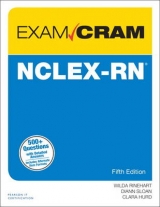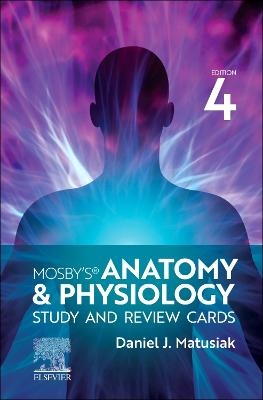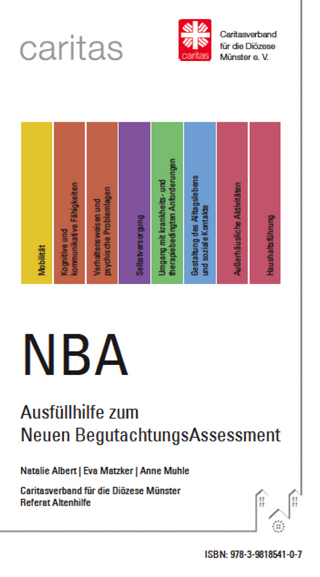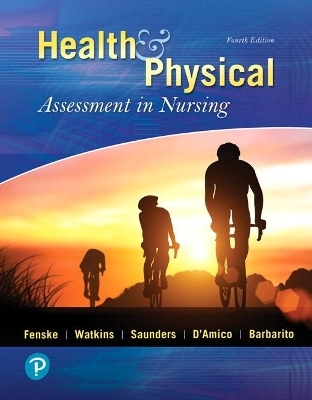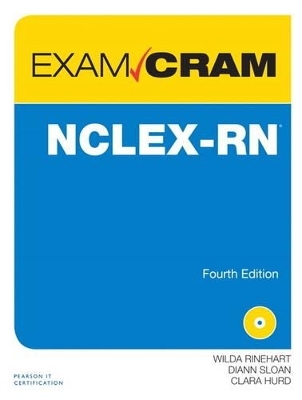
NCLEX-RN Exam Cram
Pearson IT Certification
978-0-7897-5105-8 (ISBN)
- Titel erscheint in neuer Auflage
- Artikel merken
Covers exactly what you need to know to score higher on your NCLEX-RN® exam
545 sample test questions help you gain confidence and decide when you’re ready to take the actual exam
Includes the popular Cram Sheet tearcard to help you remember key concepts and do extra last-minute studying
Exam Alerts identify important information found on the exam
Simplifies key medication aide concepts and techniques for easy learning
Covers the critical information you’ll need to know to score higher on your NCLEX-RN exam!
Discover how the NCLEX-RN exam works, and how best to prepare for it
Understand essential disease processes, treatments, and diagnostic studies
Care for clients with respiratory, genitourinary, hematopoietic, gastrointestinal, musculoskeletal, endocrine, cardiovascular, neurological, and many other disorders
Serve maternal, infant, and pediatric clients
Provide compassionate and effective emergency and psychiatric care
Consider cultural, religious, and legal concerns associated with client care
Review all stages of the nursing process: assessment, diagnosis, planning, implementation, and evaluation
Address client needs for a safe, effective-care environment; health promotion and maintenance; and psychosocial and physiological integrity
Pearson IT Certification Practice Test
The CD features the innovative Pearson IT Certification practice test, giving you an effective tool to assess your readiness for the NCLEX-RN exam.
Wilda Rinehart received an Associate Degree in Nursing from Northeast Mississippi Community College in Booneville, Mississippi. After working as a staff nurse and charge nurse, she became a public health nurse and served in that capacity for a number of years. In 1975, she received her nurse practitioner certification in the area of obstetrics-gynecology from the University of Mississippi Medical Center in Jackson, Mississippi. In 1979, she completed her Bachelor of Science degree in Nursing from Mississippi University for Women. In 1980, she completed her Master of Science degree in Nursing from the same university and accepted a faculty position at Northeast Mississippi Community College, where she taught medical-surgical nursing and maternal-newborn nursing. In 1982, she founded Rinehart and Associates Nursing Consultants. For the past 26 years, she and her associates have worked with nursing graduates and schools of nursing to assist graduates to pass the National Council Licensure Exam for Nursing. She has also worked as a curriculum consultant with faculty to improve test construction. Ms. Rinehart has served as a convention speaker throughout the southeastern United States and as a reviewer of medical-surgical and obstetric texts. She has co-authored materials used in seminars presented by Rinehart and Associates Nursing Review. As the president of Rinehart and Associates, she serves as the coordinator of a company dedicated to improving the quality of health through nursing education. Dr. Diann Sloan received an Associate Degree in Nursing from Northeast Mississippi Community College, a Bachelor of Science degree in Nursing from the University of Mississippi, and a Master of Science degree in Nursing from Mississippi University for Women. In addition to her nursing degrees, she holds a Master of Science in Counseling Psychology from Georgia State University and a Doctor of Philosophy in Counselor Education, with minors in both Psychology and Educational Psychology, from Mississippi State University. She has completed additional graduate studies in healthcare administration at Western New England College and the University of Mississippi. Dr. Sloan has taught pediatric nursing, psychiatric mental health nursing, and medical surgical nursing in both associate degree and baccalaureate nursing programs. As a member of Rinehart and Associates Nursing Review, Dr. Sloan has conducted test construction workshops for faculty and nursing review seminars for both registered and practical nurse graduates. She has co-authored materials used in the item-writing workshops for nursing faculty and Rinehart and Associates Nursing Review. She is a member of Sigma Theta Tau nursing honor society. Clara Hurd received an Associate Degree in Nursing from Northeast Mississippi Community College in Booneville, Mississippi (1975). Her experiences in nursing are clinically based, having served as a staff nurse in medical-surgical nursing. She has worked as an oncology, intensive care, orthopedic, neurological, and pediatric nurse. She received her Bachelor of Science degree in Nursing from the University of North Alabama in Florence, Alabama, and her Master of Science degree in Nursing from the Mississippi University for Women in Columbus, Mississippi. Ms. Hurd is a certified nurse educator. She currently serves as a nurse educator consultant and an independent contractor. Ms. Hurd has taught in both associate degree and baccalaureate degree nursing programs. She was a faculty member of Mississippi University for Women; Austin Peay State University in Clarksville, Tennessee; Tennessee State University in Nashville, Tennessee; and Northeast Mississippi Community College. Ms. Hurd joined Rinehart and Associates in 1993. She has worked with students in preparing for the National Council Licensure Exam and with faculty as a consultant in writing test items. Ms. Hurd has also been a presenter at nursing conventions on various topics, including itemwriting for nursing faculty. Her primary professional goal is to prepare the student and graduate for excellence in the delivery of healthcare.
Introduction . . . . . 1
Welcome to the NCLEX-RN® Exam Cram . . . 1
Taking the Computerized Adaptive Test . . . 2
The Cost of the Exam . . . . 2
How to Prepare for the Exam . . . 2
How to Use This Book. . . . 3
About the Book . . . . 4
Contact the Authors . . . . 5
Self-Assessment . . . . 5
Testing Your Exam Readiness . . . 6
Chapter 1: Preparing for the National Council Exam for Registered Nurses . . 7
Preparing for the Exam . . . . 8
The CAT Exam . . . . 8
Testing Strategies. . . . 9
Read the Question Carefully . . . 10
Look for Keywords . . . . 10
Watch for Specific Details . . . 10
Eliminate Options That Are Clearly Wrong or Incorrect . . 11
Look for Similar Options . . . 11
Look for Opposite Answers . . . 12
Remember Legalities . . . . 12
Remember Infection Control . . . 12
Exam Prep Questions . . . . 13
Answer Rationales . . . . 15
Chapter 2: Pharmacology . . . . . 17
Three Areas of Pharmacology . . . 18
How Nurses Work with Pharmacology . . . 19
Time-released Drugs . . . . 20
Administering Medications . . . . 21
The Seven Rights of Administering Medication. . 21
Understanding and Identifying the Various Drugs. . 22
Angiotensin-Converting Enzyme Inhibitors . . 22
Beta Adrenergic Blockers . . . 23
Anti-Infectives (Aminoglycosides). . . 25
Benzodiazepines (Anticonvulsants/Antianxiety) . . 26
Phenothiazines (Antipsychotic/Antiemetic). . 28
Glucocorticoids . . . . 29
Antivirals. . . . 31
Cholesterol-Lowering Agents . . . 32
Angiotensin Receptor Blockers . . . 33
Histamine 2 Antagonists. . . 34
Proton Pump Inhibitors . . . 36
Anticoagulants . . . . 37
More Drug Identification Helpers . . . 38
Herbals . . . . . 38
Drug Schedules . . . . 39
Pregnancy Categories for Drugs. . . 40
Exam Prep Questions . . . . 41
Answer Rationales . . . . 43
Chapter 3: Caring for the Client with Disorders of the Respiratory System . . 45
Chronic Obstructive Pulmonary Disease. . . 46
Chronic Bronchitis . . . . 46
Emphysema . . . . 46
Asthma . . . . 47
Acute Respiratory Infections . . . 47
Pneumonia . . . . 48
Pleurisy . . . . 49
Tuberculosis . . . . 50
Influenza . . . . 50
Acute Respiratory Failure. . . . 51
Acute Respiratory Distress Syndrome . . . 51
Pulmonary Embolus . . . . 52
Emerging Infections . . . . 53
Severe Acute Respiratory Syndrome. . . 53
Legionnaire’s Disease . . . . 54
Diagnostic Tests for Review. . . . 55
Pharmacology Categories for Review. . . 55
Exam Prep Questions . . . . 57
Answer Rationales . . . . 59
Suggested Readings and Resources. . . 60
Chapter 4: Caring for the Client with Disorders of the Genitourinary System . . 61
Acute Glomerulonephritis . . . . 62
Chronic Glomerulonephritis . . . 63
End Stage Renal Disease . . . . 64
Peritoneal Dialysis. . . . 64
Hemodialysis . . . . 64
Renal Transplantation. . . . 65
Nephrotic Syndrome . . . . 65
Urinary Calculi . . . . 66
Urinary Tract Infections. . . . 67
Genitourinary Disorders . . . . 67
Prostatitis . . . . 67
Benign Prostatic Hyperplasia . . . 68
Bladder Cancer . . . . 69
Diagnostic Tests for Review. . . . 70
Pharmacology Categories for Review. . . 70
Exam Prep Questions . . . . 72
Answer Rationales . . . . 74
Suggested Reading and Resources . . . 75
Chapter 5: Caring for the Client with Disorders of the Hematopoietic System . . 77
Anemia . . . . . 78
Pernicious Anemia. . . . 78
Aplastic Anemia . . . . 79
Sickle Cell Anemia . . . . 80
Iron Deficiency Anemia . . . 80
Cooley’s Anemia (Thalassemia Major) . . . 81
Hemophilia. . . . 81
Polycythemia Vera. . . . 82
Diagnostic Tests for Review. . . . 83
Pharmacology for Review . . . . 83
Exam Prep Questions . . . . 84
Answer Rationales . . . . 86
Suggested Reading and Resources . . . 87
Chapter 6: Caring for the Client with Disorders of Fluid and Electrolyte Balance and Acid/Base Balance. . . . 89
Basic Knowledge of Fluid and Electrolyte Balance . . 90
Regulation of pH and Its Effect on Fluid and Electrolytes. . 91
How the Body Regulates pH . . . 91
Metabolic Acidosis . . . . 91
Causes of Metabolic Acidosis. . . 91
Symptoms of Metabolic Acidosis . . . 92
Care of the Client with Metabolic Acidosis. . 92
Respiratory Acidosis . . . . 93
Causes of Respiratory Acidosis . . . 93
Symptoms of Respiratory Acidosis . . . 94
Caring for the Client with Respiratory Acidosis. . 94
Metabolic Alkalosis . . . . 95
Causes of Metabolic Alkalosis . . . 95
Symptoms of Metabolic Alkalosis . . . 95
Caring for the Client with Metabolic Alkalosis. . 96
Respiratory Alkalosis. . . . 96
Symptoms of Respiratory Alkalosis. . . 96
Care of the Client with Respiratory Alkalosis . . 97
Normal Electrolyte Values. . . . 97
Changes Associated with Aging. . . 98
Exam Prep Questions . . . . 100
Answer Rationales . . . . 102
Suggested Reading and Resources . . . 103
Chapter 7: Caring for the Client with Burns. . . . 105
Burn Classifications. . . . 106
Burn Measurement with TBSA. . . 108
Nursing Care for Burn Victims. . . 109
The Emergent Phase . . . 110
The Intermediate Phase . . . 113
Dressings for Burns. . . . 114
The Rehabilitative Phase . . . 115
Diagnostic Tests for Review. . . 116
Pharmacology Categories for Review. . . 116
Exam Prep Questions . . . . 117
Answer Rationales . . . . 119
Suggested Reading and Resources . . . 120
Chapter 8: Caring for the Client with Sensorineural Disorders . . . 121
Disorders of the Eyes . . . . 122
Intraocular Disorders . . . 122
Retinal Disorders. . . . 125
Refractive Errors . . . . 127
Traumatic Injuries . . . . 128
Visual Tests for Review. . . . 129
Pharmacology Categories for Review. . . 129
Ear Disorders. . . . 129
Otitis Externa. . . . 130
Otitis Media . . . . 130
Meniere’s Disease . . . . 130
Otosclerosis . . . . 131
Presbycusis . . . . 131
Ear Trauma. . . . 132
Assisting Clients with Hearing Loss. . . 132
Diagnostic Tests for Review. . . 132
Pharmacology Categories for Review. . . 133
Exam Prep Questions . . . . 134
Answer Rationales . . . . 136
Suggested Reading and Resources . . . 137
Chapter 9: Caring for the Client with Cancer. . . . 139
Cancer. . . . . 140
American Cancer Society’s Seven Warning Signs of Cancer . 140
The Four Major Categories of Cancer . . . 140
Risk Factors for Specific Cancers . . . 141
Cancer Prevention. . . . 143
Patient Teaching . . . . 143
Management of the Client with Cancer. . . 143
Radiation. . . . 144
Chemotherapy . . . . 145
Bone Marrow and Peripheral Stem Cell Transplantation (PSCT) . 147
Types of Transplants . . . . 148
Nursing Care After Transplantation. . . 148
Hodgkin’s Lymphoma . . . . 149
Diagnosis of Hodgkin’s Lymphoma . . . 150
Prognosis of Hodgkin’s Lymphoma . . . 150
Treatment of Hodgkin’s Lymphoma. . . 150
Diagnostic Tests for Review. . . 151
Pharmacology for Review . . . . 152
Exam Prep Questions . . . . 154
Answer Rationales . . . . 156
Suggested Reading and Resources . . . 157
Chapter 10: Caring for the Client with Disorders of the Gastrointestinal System . . 159
Ulcers . . . . . 160
Types of Ulcers . . . . 160
Treatment of Ulcers . . . . 161
Inflammatory Bowel Disorders . . . 163
Crohn’s Disease (Regional Enteritis) . . . 163
Ulcerative Colitis. . . . 164
Diverticulitis. . . . 165
Diagnosis of Diverticulitis . . . 165
Treatment of Diverticulitis. . . 166
Gastroesophageal Reflux Disease (GERD) . . . 166
Diseases Associated with the Liver . . . 167
Hepatitis . . . . 167
Cirrhosis . . . . 172
Pancreatitis . . . . 174
Cholecystitis/Cholelithiasis . . . 176
Symptoms of Cholecystitis and Cholelithiasis. . 176
Diagnosis of Cholecystitis/Cholethiasis . . . 177
Treatment of Cholecystitis. . . 177
Treatment of Cholethiasis . . . 177
Clostridium Difficile. . . . 178
Food-Borne Illnesses . . . . 179
Diagnostic Tests for Review. . . 180
Pharmacology for Review . . . . 180
Exam Prep Questions . . . . 182
Answer Rationales . . . . 184
Suggested Reading and Resources . . . 185
Chapter 11: Caring for the Client with Disorders of the Musculoskeletal System . . 187
Fractures. . . . 188
Treating Fractures . . . . 188
Compartment Syndrome . . . 191
Osteomyelitis . . . . 192
Osteoporosis. . . . 193
Treatment of Osteoporosis. . . 194
Gout . . . . . 195
Treatment of the Client with Gout. . . 195
Rheumatoid Arthritis . . . . 195
Treatment of Rheumatoid Arthritis . . . 196
Musculoskeletal Surgical Procedures . . . 197
Fractured Hip and Hip Replacement . . . 197
Total Knee Replacement . . . 198
Amputations . . . . 199
Assistive Devices for Ambulation . . . 201
Crutches . . . . 201
Canes. . . . 202
Walkers . . . . 202
Diagnostic Tests for Review. . . 203
Pharmacology for Review . . . . 203
Exam Prep Questions . . . . 205
Answer Rationales . . . . 207
Suggested Reading and Resources . . . 208
Chapter 12: Caring for the Client with Disorders of the Endocrine System . . 209
The Endocrine System. . . . 210
Pituitary Disorders . . . . 210
Tumors of the Pituitary . . . 211
Thyroid Disorders . . . . 213
Hypothyroidism. . . . 213
Hyperthyroidism . . . . 214
Parathyroid Disorders. . . . 216
Hypoparathyroidism . . . . 216
Hyperparathyroidism . . . 217
Adrenal Gland Disorders . . . . 218
Adrenocortical Insufficiency (Addison’s Disease) . . 218
Adrenocortical Hypersecretion (Cushing’s Syndrome) or Cushing’s Disease. . . 219
Diabetes Mellitus. . . . 219
Diagnostic Tests for Review. . . 223
Pharmacology Categories for Review. . . 223
Exam Prep Questions . . . . 224
Answer Rationales . . . . 226
Suggested Reading and Resources . . . 227
Chapter 13: Caring for the Client with Disorders of the Cardiovascular System . . 229
Hypertension . . . . 230
Medications Used to Treat Hypertension . . 231
Heart Block . . . . 231
Toxicity to Medications . . . 233
Malfunction of the Conduction System . . . 233
Myocardial Infarction . . . . 234
Diagnosis of Myocardial Infarction . . . 235
Management of Myocardial Infarction Clients . . 236
Inflammatory Diseases of the Heart. . . 239
Infective Endocarditis . . . 239
Pericarditis . . . . 239
Buerger’s Disease. . . . 240
Thrombophlebitis . . . . 240
Raynaud’s Syndrome. . . . 241
Aneurysms . . . . 241
Congestive Heart Failure . . . . 242
Diagnostic Tests for Review. . . 242
Pharmacology Categories for Review. . . 243
Exam Prep Questions . . . . 244
Answer Rationales . . . . 246
Suggested Reading and Resources . . . 247
Chapter 14: Caring for the Client with Disorders of the Neurological System . . 249
Seizures. . . . . 250
Types of Seizures . . . . 250
Treatment of Seizure Clients. . . 252
Status Epilepticus . . . . 253
Brain Injuries . . . . 253
Epidural Hematomas . . . 254
Subdural Hematoma . . . . 254
Treatment of Epidural and Subdural Hematomas . . 254
Increased Intracranial Pressure . . . 255
Treatment of ICP . . . . 257
Neurological Assessment . . . . 258
Cranial Nerve Assessment . . . 258
Glasgow Coma Scale. . . . 259
Intracranial Pressure Monitors . . . 260
Care of the Client with Intracranial Surgery (Craniotomy) . . 260
Cerebrovascular Accident/Stroke . . . 262
Spinal Cord Injury . . . . 263
Treatment of Spinal Cord Injuries . . . 263
Potential Complications with SCI Clients. . 264
Guillain-Barré . . . . 265
Treating Clients with Guillian-Barré . . . 266
Degenerative Neurological Disorders . . . 266
Diagnostic Tests for Review. . . 267
Pharmacology for Review . . . . 267
Exam Prep Questions . . . . 269
Answer Rationales . . . . 271
Suggested Reading and Resources . . . 272
Chapter 15: Caring for the Client with Psychiatric Disorders . . . 273
Anxiety-Related Disorders . . . . 274
Generalized Anxiety Disorder . . . 274
Post-traumatic Stress Disorder . . . 275
Dissociative Identity Disorder . . . 275
Somatoform Disorder. . . 276
Panic Disorder . . . . 276
Phobic Disorders . . . . 277
Obsessive-Compulsive Disorder . . . 277
Personality Disorders . . . . 278
Cluster A. . . . 278
Cluster B. . . . 279
Cluster C . . . . 280
Managing Clients with Personality Disorders. . 281
Psychotic Disorders . . . . 282
Schizophrenia. . . . 282
Bipolar Disorders . . . . 284
Substance Abuse . . . . 286
Alcoholism . . . . 286
Other Commonly Abused Substances . . . 288
Disorders of Childhood and Adolescence . . . 291
Conduct Disorder . . . . 291
Oppositional Defiant Disorder . . . 291
Attention Deficit Hyperactive Disorder. . . 291
Autistic Disorder . . . . 292
Eating Disorders . . . . 293
Diagnostic Tests for Review. . . 293
Pharmacology Categories for Review. . . 294
Exam Prep Questions . . . . 295
Answer Rationales . . . . 297
Suggested Reading and Resources . . . 298
Chapter 16: Caring for the Maternal/Infant Client. . . 299
Signs of Pregnancy . . . . 300
Presumptive Signs . . . . 300
Probable Signs . . . . 300
Positive Signs . . . . 301
Prenatal Care . . . . 301
Prenatal Diet and Weight Maintenance. . . 301
Alpha-Fetoprotein Screening. . . 301
Other Prenatal Diagnostic Tests . . . 302
Assessing Fetal Heart Tones . . . 303
Ultrasonography . . . . 303
Signs of Complications of Pregnancy. . . 303
Types of Abortions . . . . 304
Complications Affecting Pregnancy . . . 305
Diabetes in Pregnancy . . . 305
Preeclampsia. . . . 306
Disseminated Intravascular Coagulation . . 307
Cord Prolapse . . . . 307
Abruptio Placenta . . . . 307
Placenta Previa. . . . 307
Maternal Infections. . . . 308
Preterm Labor . . . . 310
Intrapartal Care . . . . 311
Stages of Labor . . . . 311
Phases of Labor . . . . 312
Important Terms You Should Know. . . 312
Prelabor Testing . . . . 313
Fetal Monitoring . . . . 314
Pharmacologic Management of Labor. . . 316
Postpartum Care . . . . 317
Terms Associated with the Normal Newborn. . . 317
Rh Incompatibility . . . . 318
Contraception . . . . 319
Diagnostic Tests for Review. . . 320
Pharmacology Categories for Review. . . 321
Exam Prep Questions . . . . 322
Answer Rationales . . . . 324
Suggested Reading and Resources . . . 325
Chapter 17: Caring for the Pediatric Client . . . . 327
Growth and Development . . . . 328
Infant (28 Days to 1 Year) . . . 328
Toddler (1–3 Years) . . . . 330
Preschooler (3–5 Years) . . . 331
School Age (6–12 Years) . . . 332
Adolescence (12–18 Years) . . . 333
Congenital Anomalies. . . . 334
Anomalies of the Gastrointestinal System . . 334
Anomalies of the Musculoskeletal System . . 338
Anomalies of the Cardiovascular System . . 340
Inborn Errors of Metabolism . . . 343
Respiratory Disorders. . . . 344
Acute Otitis Media . . . . 345
Tonsillitis . . . . 346
Laryngotracheobronchitis . . . 347
Acute Epiglottitis. . . . 347
Bronchiolitis . . . . 348
Cystic Fibrosis (Mucoviscidosis) . . . 349
Gastrointestinal Disorders . . . . 350
Gastroenteritis . . . . 350
Pyloric Stenosis . . . . 350
Intussusception . . . . 351
Celiac (Gluten-Induced Enteropathy, Celiac Sprue) . . 351
Cardiovascular Disorders . . . . 351
Rheumatic Fever . . . . 352
Kawasaki’s Disease (Mucocutaneous Lymph Node Syndrome) . 353
Musculoskeletal Disorders . . . . 354
Scoliosis. . . . 354
Legg-Calve-Perthes Disease (Coxa Plana) . . 355
Muscular Dystrophies. . . 355
Childhood Cancer. . . . 356
Wilms Tumor (Nephroblastoma) . . . 356
Leukemia . . . . 356
Osteogenic Sarcoma (Osteosarcoma) . . . 357
Ingestion of Hazardous Substances . . . 357
Salicylate Overdose . . . . 357
Acetaminophen (Tylenol) Overdose . . . 357
Lead (Plumbism) . . . . 358
Iron Poisoning . . . . 358
Diagnostic Tests for Review. . . 359
Pharmacology Categories for Review. . . 359
Exam Prep Questions . . . . 360
Answer Rationales . . . . 362
Suggested Reading and Resources . . . 363
Chapter 18: Emergency Nursing. . . . 365
The ABCDs of Emergency Care . . . 366
Airway . . . . 367
Breathing . . . . 367
Circulation . . . . 368
Deficits . . . . 369
Obtaining Client Information . . . 369
Trauma . . . . . 370
Head Injuries . . . . 370
Chest Injuries. . . . 371
Abdominal Injuries . . . . 371
Documenting and Protecting Forensic Evidence . . 372
Poisoning . . . . 373
Poisonous Stings and Bites . . . 374
Bioterrorism. . . . 375
Chemical and Biological Agents . . . 375
Nuclear Warfare . . . . 378
Triage Categories for Disaster Victims . . . 379
Diagnostic Tests for Review. . . 379
Pharmacology Categories for Review. . . 380
Exam Prep Questions . . . . 381
Answer Rationales . . . . 383
Suggested Reading and Resources . . . 384
Chapter 19: Cultural Practices Influencing Nursing Care. . . 385
Cultural Assessment . . . . 386
Understanding Client Beliefs. . . 386
Working with Clients Who Speak Different Languages. . 387
Healthcare of Hispanics/Latinos. . . 388
Time Considerations. . . . 389
Use of Nonverbal/Verbal Communication . . 389
Childbirth and Pain Response . . . 390
Healthcare of Native Americans and Alaskan Natives. . 390
Time Considerations. . . . 391
Use of Nonverbal/Verbal Communication . . 391
Childbirth and Pain Response . . . 391
Healthcare of Asian-Americans . . . 391
Time Considerations. . . . 393
Use of Nonverbal/Verbal Communication . . 393
Childbirth and Pain Response . . . 393
Healthcare of Arab-Americans . . . 393
Time Considerations. . . . 394
Use of Nonverbal/Verbal Communication . . 394
Childbirth and Pain Response . . . 394
Nursing Plan Dietary Considerations Across Cultures . . 395
Religious Beliefs and Refusal of Care Considerations . . 396
Exam Prep Questions . . . . 400
Answer Rationales . . . . 402
Suggested Reading and Resources . . . 403
Chapter 20: Legal Issues in Nursing Practice . . . . 405
Types of Laws . . . . 406
Statutory Laws/Regulatory Laws . . . 407
Civil Laws. . . . 407
Criminal Laws . . . . 407
Common Law . . . . 407
Code of Ethical Behavior in Nursing Practice . . 409
Legal Theories That Affect Nursing Practice . . 410
Negligence . . . . 410
Malpractice. . . . 410
Witnessing Consent for Care . . . 411
Tort . . . . 411
Assault and Battery . . . . 411
Fraud . . . . 411
Managing Client Care . . . . 411
Exam Prep Questions . . . . 417
Answers to Exam Questions. . . 419
Suggested Reading and Resources . . . 420
Practice Exam I . . . . 421
Practice Exam II . . . . 475
Answers to Practice Exam I . . . . 529
Answers to Practice Exam II. . . . 559
Appendix A: Things You Forgot . . . . 589
Appendix B: Need to Know More? . . . . 597
Appendix C: Calculations. . . . . 605
Appendix D: Most-Prescribed Medications in the United States . . . 609
Appendix E: Alphabetical Listing of Nursing Boards in the United States and Protectorates . 613
TOC, 9780789751058, 7/18/2013
| Verlagsort | Upper Saddle River |
|---|---|
| Sprache | englisch |
| Maße | 180 x 231 mm |
| Gewicht | 1104 g |
| Themenwelt | Medizin / Pharmazie ► Pflege |
| Medizin / Pharmazie ► Studium | |
| Sozialwissenschaften ► Pädagogik | |
| ISBN-10 | 0-7897-5105-4 / 0789751054 |
| ISBN-13 | 978-0-7897-5105-8 / 9780789751058 |
| Zustand | Neuware |
| Haben Sie eine Frage zum Produkt? |
aus dem Bereich
